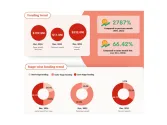
Why Jakarta’s hotel sector is set to have a lacklustre performance in Q4
The sector won’t recover until Q2 2024.
Q3 2023 can be regarded as a peak period for hotels, particularly in Jakarta. According to Colliers, offline events are being optimised and scheduled before the election campaign season, and government activities are also being ramped up as the year draws to a close. As a result, the fourth quarter is expected to witness a surge in activities related to the presidential election, both from political parties and from other associated stakeholders.
Here’s more from Colliers:
In Q4 2023, it is predicted that hotel performance will be on a downward trajectory. This decline is attributable to several factors. Firstly, year-end typically marks a period of reduced business activities. Secondly, the impending presidential election is expected to have an impact on business dynamics. While certain government-related activities, particularly within the MICE sector, are projected to persist, corporate activities are likely to wind down by mid-December, coinciding with the onset of the Christmas and New Year holidays.
Moving into 2024, the performance of hotels in Jakarta is set to rebound in the second quarter. Several factors influence this anticipated upturn. To begin with, the early part of the year typically experiences a business slowdown, this time exacerbated by the uncertainty surrounding the election results.
The introduction of a new president and their associated policies induce a “wait-and-see” approach among businesses. However, it is worth noting that if a second round of elections is necessitated, the anticipated business rebound may be postponed. Furthermore, the fasting month and Eid holiday, falling in Q1 2024 are expected to significantly curtail business activities.
As we approach the end of 2023, it is evident that the overall trend in hotel performance remains relatively positive. Nonetheless, a downturn in hotel business is projected for early 2024, due to the persistent sluggishness in business operations and the influence of the presidential election, particularly in the Jakarta region.
Furthermore, the possibility of a new president and the unveiling of new policies introduce an element of unpredictability into the business landscape.



















 Advertise
Advertise







